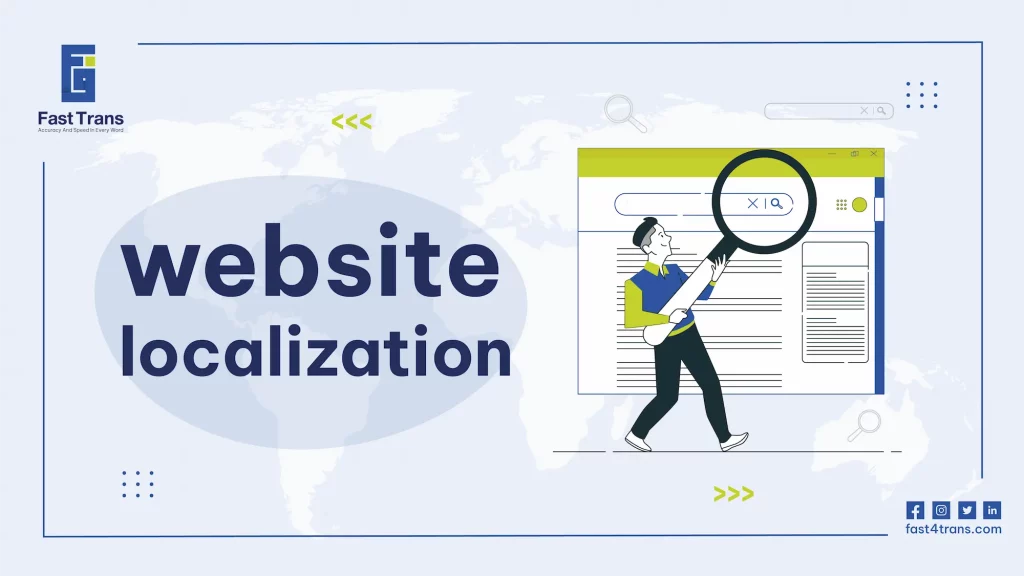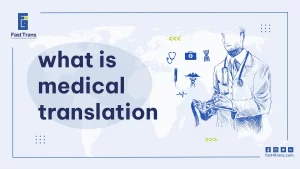Arabic website localization is key to connecting with Arabic-speaking audiences by adapting your site’s content, visuals, and user experience to match their cultural and linguistic preferences. Beyond translation, it involves optimizing SEO with region-specific keywords and tailoring every detail for a more relatable, trustworthy experience.
Importance of Arabic Website Localization not only boosts your search engine rankings and expands your reach but also fosters deeper engagement, turning your website into a valuable tool for building credibility, increasing conversions, and tapping into the vast Arabic-speaking market.
What is the meaning of Arabic website localization?
Arabic website localization is the process of adapting a website to meet the needs and cultural preferences of Arabic-speaking audiences. All content on the website must be translated into Arabic, taking into account the specific dialect and regional variations of the target audience.
In the process of localizing a website for Arabic speakers, many cultural aspects unique to this group are also considered, from how the content is presented to how it interacts with the user, ensuring it aligns with the cultural and linguistic expectations of Arabic-speaking users.
What is the difference between Arabic website localization and Arabic website translation?
The difference between Arabic website localization and Arabic website translation is that Arabic website translation is part of the Arabic website localization process. However, in some cases, it can be done independently, while in others, it may be unnecessary.
Arabic Website Localization:
Arabic website localization is the process of adapting a website’s content to align with Arabic-speaking users’ cultural preferences and norms, ensuring they feel comfortable and familiar with the website. This process involves adjusting not only the language but also audio, visual, and interactive elements to meet cultural expectations.
When the target audience’s language differs from the original website’s language, translating the website content into Arabic can be part of the localization process, but it is just one element of a more comprehensive cultural adaptation.
Arabic Website Translation:
Arabic website translation is often a crucial step in the Arabic website localization process. It enables the website to reach Arabic-speaking audiences, expanding its visitor base. However, simply translating the website content into Arabic will not guarantee the same level of success as proper localization. Without considering the cultural factors, which go beyond the language differences, the website might fail to connect with Arabic users effectively.
What are the Importance of Arabic Website Localization?
Importance of Arabic Website Localization is enhancing SEO by boosting search engine rankings through relevant keywords, while building trust and credibility with Arabic-speaking users. It expands audience reach, increases engagement, and drives higher conversion rates, ultimately improving brand reputation and sales.
1. Improve your website’s ranking:
Localization of websites to Arabic will improve the ranking of the website in search engines. By using relevant Arabic keywords and terms commonly searched by Arabic-speaking users, your website’s visibility and traffic can increase significantly, which will, in turn, raise its ranking in search engines.
2. Improve the brand image:
Localizing your website to Arabic helps build trust with Arabic-speaking visitors, as it shows that the website has been specifically designed for them, reflecting their language and culture. This enhances the mental image of the brand and assures users that the brand is committed to meeting their needs in a way that resonates with their values.
3. Reach a larger audience:
By localizing your website to Arabic, you can expand your audience to millions of Arabic speakers. This allows you to connect with a new demographic, enabling them to understand and engage with your content. This expanded reach will increase the awareness of your brand and products, ultimately helping you tap into new markets and boost your reputation in the Arabic-speaking world, which can translate into financial growth.
4. Increase the credibility of the website among its visitors:
Arabic website localization boosts your credibility with Arabic-speaking visitors. They will feel that the website is more familiar and relatable, as it caters to their language and culture. Visitors are more likely to trust a website that appears to be developed for their community, which increases their comfort and engagement with the site. Websites that adapt to specific cultural contexts are seen as more trustworthy than those that don’t.
5. Increase the percentage of purchases from the website:
Localization plays a significant role in increasing the percentage of purchases on your website. By improving search engine rankings, opening your website to a broader audience, facilitating communication with Arabic-speaking cultures, and enhancing your brand’s appearance, Arabic website localization helps boost visitors’ trust. All of these factors contribute to higher conversion rates and, ultimately, a stronger bottom line for your business.
Read more: 11 Golden Steps for Website Localization
How does Arabic website localization work?
Arabic website localization involves understanding your target audience’s culture and values, crafting a detailed strategy, selecting skilled professionals, translating content with cultural nuance, and optimizing for local SEO by choosing relevant keywords to enhance engagement and search rankings. This ensures your site resonates with Arabic-speaking users and meets market expectations.
1. Figure out and analyze your target audience:
The process of localizing a website begins with identifying and researching the Arabic-speaking target audience, taking into account their language, culture, customs, and values. Along with studying how businesses like yours sell their products in Arabic-speaking markets, you should also research the local market conditions for the product in question and how they encourage suitable consumer engagement with their brands and products in the Arab world. It’s essential to research the new Arabic market you’re entering to ensure you’re prepared and that it is ready to accept your brand, rather than simply choosing Arabic as a language and randomly translating content into it.
2. Creating a detailed plan for the localization process:
After researching your target Arabic market, the next stage in localizing your website is to create a detailed plan for the process. This involves converting the data you’ve gathered into actionable, clear steps that will ultimately help you achieve your goal. At this point, you should decide which steps to take in the localization process for your Arabic website, in what order to complete them, and how to assess each step’s effectiveness, considering the unique characteristics of the Arabic-speaking audience.
3. Choosing the right experts to complete the project:
One of the key elements in localizing a website for the Arabic market is choosing the right experts to complete the work. Selecting qualified professionals is crucial for several reasons. These include having highly skilled technical developers who can handle all technical aspects of the project and prepare the website for localization into Arabic; designers who can ensure the site maintains an appealing and culturally appropriate image for Arabic visitors; and translators who can bridge the gap between your content and the cultural expectations of Arabic-speaking users.
4. Content translation:
The third step in localizing a website for Arabic is translating the content from its native language into Arabic. This stage involves not only translating sentences and phrases linguistically but also performing cultural translation to adjust original cultural elements of the site to those of the Arabic-speaking audience, helping them feel at home on your website. You should assign this task to a translator specialized in website content, preferably someone familiar with the market you’re targeting. This will significantly ease your entry into the Arabic-speaking market and enhance the relevance of your content.
5. Adjusting the work strategy to enhance the website’s search engine ranking:
Lastly, you need to adjust your business plan based on the website’s search engine ranking within the Arabic market. Since this is a new market with a different audience, you should tailor your strategy to resonate with Arabic-speaking users. Select keywords that are more relevant to the Arabic market, and research the interests of your Arabic-speaking clients, using strategies that will keep them engaged and encourage repeat visits to your website.
read more: what is Software internationalization
What are the basics of Arabic website content localization?
Arabic website content localization involves creating original, culturally relevant content and adjusting promotional materials to resonate with the target market. It also requires ensuring legal content complies with local regulations in each Arabic-speaking region.
1- Make original content:
It is important to maintain the uniqueness of the overall content related to your brand identity, ensuring that it reflects who you are. When localizing for an Arabic-speaking audience, be mindful of selecting phrases that resonate with Arabic-speaking customers and appropriately convey your identity and goals.
Ask your translators to localize these texts for Arabic and have them reviewed by a native Arabic speaker to ensure they are culturally appropriate and appealing to the Arabic market. Repeat this process for all the Arabic dialects you target within the regions of the Arab world.
2- Adjusting the promotional materials:
One of the most crucial aspects of promoting the localization of your Arabic website is adapting its marketing materials to the culture of your Arabic audience. Hiring a web content localization specialist who is a native Arabic speaker is invaluable, as they understand the intricacies of the language and culture, and can best capture the spirit of Arabic-speaking communities.
During this phase, the text is translated into Arabic and modified to fit the cultural norms and expectations of the Arab audience. A creative designer can also incorporate Arabic cultural elements into images and videos to make the visual content more engaging and relatable to the target audience.
3- Localizing legal content:
As laws and regulations differ between countries, and sometimes even within regions of the same country, localizing the legal content of your website is crucial. For Arabic-speaking markets, this means ensuring your website’s legal policies comply with the laws of each specific Arabic-speaking country you target. Failing to adapt your policies to local legal requirements can harm your website’s credibility and potentially damage your brand.
At this stage, consider hiring a legal expert familiar with the specific laws of each Arab country you’re targeting to ensure that your website’s legal content aligns with local regulations.
Read more about: The Ultimate Arabic Localization Checklist
What should be localized on websites into Arabic?
Websites should localize written, audio, visual, and interactive content into Arabic, ensuring SEO-friendly and culturally relevant elements. Avoid direct translations and adapt each aspect to resonate with Arabic-speaking audiences.
1. Written material:
You must localize your website’s written content, such as articles, marketing offers, product landing pages, and company profile pages, into Arabic. It is important to make each visitor or customer feel as though the content was created just for them in their language and cultural context.
2. Audio content:
A particular type of content that needs to be localized when localizing your website is audio. If it is not in Arabic, the visitor will not understand it, or if it is in Arabic but not expressed correctly, the client will not accept it as intended. As a result, make sure that any audio content you include aligns with the expectations of your Arabic-speaking visitors and provides a favorable impression of your online presence.
3. Visual content:
The visual content on your website, including images and videos, should also be localized for an Arabic audience. If the images and videos represent only one culture or region, you won’t get genuine engagement from all Arabic-speaking audience segments. To attract customers from different Arabic-speaking countries, include regional elements and culturally relevant visuals in your photographs and videos.
4. Interactive content:
Interactive content such as purchase buttons, booking services, finding out more about a particular offer, or even contact buttons should be specially designed to match Arabic localization. This includes right-to-left (RTL) text orientation and other adjustments that align with the local language and user experience expectations.
Invest in the best Arabic website localization service:
We at Fast Trans use a highly qualified website localization team, who specialize in all aspects of the website localization process and gained insight by analyzing many other website experiences because we always want the best for you and we know the importance of the process for the success and growth of your small business.
As a result, Fast-trans certified translation has established itself as a leader in the website localization industry and has the most skilled and knowledgeable team in this sector. Don’t accept less than fast-trans; get in touch with us right now!
According to website localization, traders and companies may now easily distribute their ideas beyond a large geographic area with just a few clicks, compared to the days when doing so required a great deal of work, time, and money.
Conclusion
Importance of Arabic Website Localization for adapting your website to meet the cultural, linguistic, and market expectations of Arabic-speaking users. This process goes beyond translating text—it involves reshaping content, visuals, and interactive features to ensure they resonate with the audience. By localizing your website, you increase its relevance and appeal to Arabic users, improving user engagement and trust. The result is a better user experience that strengthens brand credibility and boosts conversions, as the website feels tailored to their specific cultural and linguistic needs.
In terms of SEO, Arabic website localization is crucial for boosting search engine rankings. Incorporating region-specific keywords and adjusting content to align with local search behaviors increases visibility and helps attract more targeted traffic. Furthermore, localized websites foster stronger connections with the audience, as they reflect a genuine understanding of local customs, values, and preferences. This not only enhances your online presence but also opens up access to a vast market of Arabic speakers, offering significant opportunities for expansion and revenue growth.











